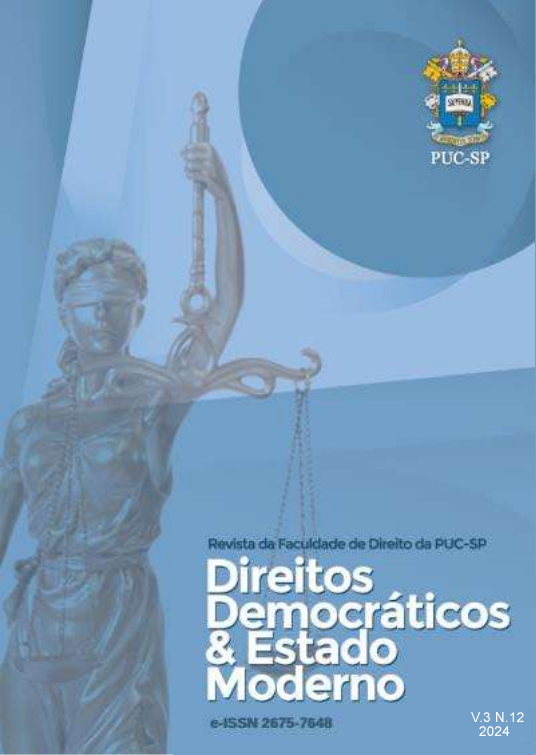Time no law - objective good faith and the theory of proper acts - suppressio and surrectio
DOI:
https://doi.org/10.23925/ddem.v.3.n.12.68160Keywords:
Constitutional Law, Civil right, Objective good faith, Legal securityAbstract
This article analyzes the effects of time in Law with its reflections on legal business relations from the perspective and performance of two legal institutes, supressio and surrectio, arising from the legal principle of objective good faith, aims to create, modify and also extinguish subjective and direct postetative rights, with the present research being elaborated by the fully bibliographic method of analysis of specialized doctrine, as well as the legislation applicable to institutes, whose general objective was to carry out an analysis of the effects of the passage of time in business relations, and with objectives specific in the analysis of the institutes of supressio and surrectio, within this context, tracing their conceptualization, differentiation and application to legal relations, concluding that such legal instruments, as well as other institutes of material and procedural law, such as prescription, decadence and estoppel, supressio and surrectio have a far-reaching role. tion of stabilization of legal and social relations and, as well as, of social pacification, the purpose for which the Law exists.
References
AGUIAR JÚNIOR, Ruy Rosado de. Extinção dos Contratos por incumprimento do devedor. 2ª Edição, Rio de Janeiro, Editora: AIDE, 2003.
AGUIAR JUNIOR, Ruy Rosado. op. cit.; GONÇALVES, Carlos Roberto. Direito Civil brasileiro: Contratos e atos unilaterais. 16ª Edição, São Paulo – SP, Editora: Saraiva, 2019.
BRASIL. Constituição da República Federativa do Brasil de 1988, proclamada em 05 de outubro de 1988. Disponível em: http://www.planalto.gov.br/ccivil_03/constituicao/constituicao.htm. Acesso em: 12 nov. 2021.
BRASIL. Lei Federal 10.406 de 10 de janeiro de 2002: Código Civil brasileiro. Disponível em: http://www.planalto.gov.br/ccivil_03/leis/2002/l10406compilada.htm. Acesso: 12 nov. 2021.
BRASIL. Lei Federal 13.105 de 16 de março de 2015: Código de Processo Civil brasileiro. Disponível em: http://www.planalto.gov.br/ccivil_03/_ato2015-2018/2015/lei/l13105.htm. Acesso: 12 nov. 2021.
BRASIL. Superior Tribunal de Justiça – STJ, Recurso Especial nº 1.323.404/GO. – Terceira Turma, Rel. Min. Nancy Andrighi, Brasília – DF, data do julgamento: 27/08/2013.
BRASIL. Superior Tribunal de Justiça – STJ, Recurso Especial nº 141.879/SP. – Quarta Turma, Rel. Min. Ruy Rosado de Aguiar, Brasília – DF, data do julgamento: DJU 22/06/1998.
CAMARA LEAL. Antonio Luiz. Da prescrição e da decadência. 4ª Edição por Aguiar Dias, Rio de Janeiro, Editora Forense, 1982.
CORDEIRO, António Menezes. Da boa-fé no Direito Civil. Vol. II, Coimbra: Almedina, 1984, p. 745.
FARIAS, Cristiano Chaves; ROSENVALD, Nelson; BRAGA NETO, Felipe Peixoto. Curso de Direito Civil. 3º Volume, Salvador – BA, Editora: JusPODIVM, 2014.
FARIAS, Cristiano Chaves de e ROSENVALD, Nelson. Direito Civil – Teoria Geral. 6ª. edição. Rio de Janeiro: Editora Lúmen Júris, 2016, p. 522.
GONÇALVES. Carlos Roberto. Direito Civil Brasileiro: Parte Geral. 17ª Edição, São Paulo – SP, Editora Saraivajur, 2019.
LEAL, Adisson. Responsabilidade Civil e Inadimplemento no Direito Brasileiro: Violação Positiva do Contrato. São Paulo, ed. Atlas, 2014.
MARTINS-COSTA, Judith. A boa-fé no direito privado. São Paulo - SP, Editora: Revista dos Tribunais, 1999.
MEZZOMO, Marcelo Colombelli. A boa-fé objetiva e seus institutos. Revista Jus Navigandi, Teresina, ano 10, n. 1212, 26 out. 2006. Disponível em: http://jus2.uol.com.br/doutrina/texto.asp?id=9087. Acesso em: 06 abr. 2021.
SILVA, Júlio César Balleirini. Artigo. Da teoria dos atos próprios: o abuso de direito. Disponível em: https://www.migalhas.com.br/depeso/252786/da-teoria-dos-atos-proprios--o-abuso-de-direito, acesso em 24/09/2021.
TARTUCE, Flávio. Manual do direito civil. 2ª Edição, São Paulo – SP, Editora Método, 2012.
XAVIER, José Tadeu Neves. Artigo: A aplicação da supressio (VERWIRKUNG) no âmbito das relações privadas. Revista Brasileira de Direito Civil – RBDCivil | Belo Horizonte, vol. 13, p. 61-91, jul./set. 2017.
WAMBIER, Luiz Rodrigues. Revista dos Tribunais 915/280. Janeiro de 2017.
Downloads
Published
How to Cite
Issue
Section
License
Copyright (c) 2024 Democratic Rights & Modern State

This work is licensed under a Creative Commons Attribution 4.0 International License.
This work is licensed under a License Creative Commons Atribuição 4.0 Internacional.
The authors grant the journal all copyrights relating to the published works. The concepts issued in signed articles are the absolute and exclusive responsibility of their authors.
DD&EM Magazine - ISSN 2675-7648

















